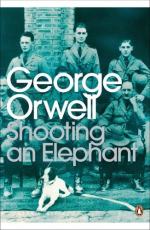
|
| Name: _________________________ | Period: ___________________ |
This test consists of 15 multiple choice questions and 5 short answer questions.
Multiple Choice Questions
1. How does Gulliver believe science should be used?
(a) As a mental exercise.
(b) To prove that some religious beliefs are absurd.
(c) For practical applications, like technology, that improve the welfare of all.
(d) To wield power over those who aren't educated.
2. How do the Burmese treat the narrator?
(a) They are respectful and grateful to him.
(b) They are respectful to his face, but sneer at him behind his back.
(c) They harass and insult him whenever they can.
(d) They are openly violent at times.
3. What does Orwell compare to a "pre-fabricate hen-house"?
(a) Sentences made of clichéd phrases.
(b) Works written by more than one author.
(c) Poorly thought-out paragraphs.
(d) Stories with poorly fleshed-out characters.
4. Why does the narrator hesitate to kill the elephant?
(a) He is afraid of the repercussions from the angry crowd.
(b) He feels compassion for it.
(c) He doesn't want to lose face.
(d) It is a large and expensive piece of machinery.
5. How does Orwell feel about the English language?
(a) It is improving.
(b) It is in decline, but can be saved.
(c) It is neither improving nor declining.
(d) It is declining, and the trend is irreversible.
6. According to Burnham, what is the most important factor for class mobility, in the society he envisions?
(a) Appearance.
(b) Wealth.
(c) Ability.
(d) Genealogy.
7. To Orwell, freedom of the press means the liberty to do what?
(a) Express personal opinions.
(b) Put a spin on the story, as long as the facts are correct.
(c) Criticize and oppose.
(d) Report anything, whether it is true or not.
8. What is in the prisoner's cell?
(a) A plank bed and water pot.
(b) A bedroll.
(c) Nothing.
(d) A cot and toilet.
9. How did the narrator leave the hospital?
(a) He transferred to another hospital, to be under the care of his own doctor.
(b) He left fully recovered with a doctor's discharge.
(c) Once his condition was stable, he was moved to another facility.
(d) He fled before his time was up, and without an official discharge.
10. The fourth speaker, in Chapter 8, defended the purges in what country?
(a) Russia.
(b) Pakistan.
(c) Israel.
(d) Italy.
11. What does Burnham say about the Nazis?
(a) They were good soldiers, with corrupt leadership.
(b) They were well intended, but misguided.
(c) They were monsters.
(d) They may have been monsters in a different era, but in this one, they were fine.
12. What do the magistrates and police do after the prisoner's death?
(a) Sleep.
(b) Go back to work.
(c) Pray.
(d) Drink.
13. What creature intervenes as the prisoner is being led to his execution?
(a) A stray dog.
(b) A stray cat.
(c) An elephant.
(d) A scorpion.
14. How does Orwell describe Gandhi's political solutions?
(a) "Godly."
(b) "Backwards."
(c) "Medievalist."
(d) "Progressive."
15. In what stage of Tolstoy's life did this major change occur?
(a) Old age.
(b) Middle age.
(c) Youth.
(d) Young adulthood.
Short Answer Questions
1. What is the subject of Gulliver's ranting in the second book of "Gulliver's Travels"?
2. What does Burnham write about the atrocities Stalin committed?
3. What two groups does Orwell name as an example of people for whom Satyagraha would be an ineffective political tool?
4. According to Orwell, what political structure fosters great literature?
5. What does Burnham write about Stalin?
|
This section contains 638 words (approx. 3 pages at 300 words per page) |

|




